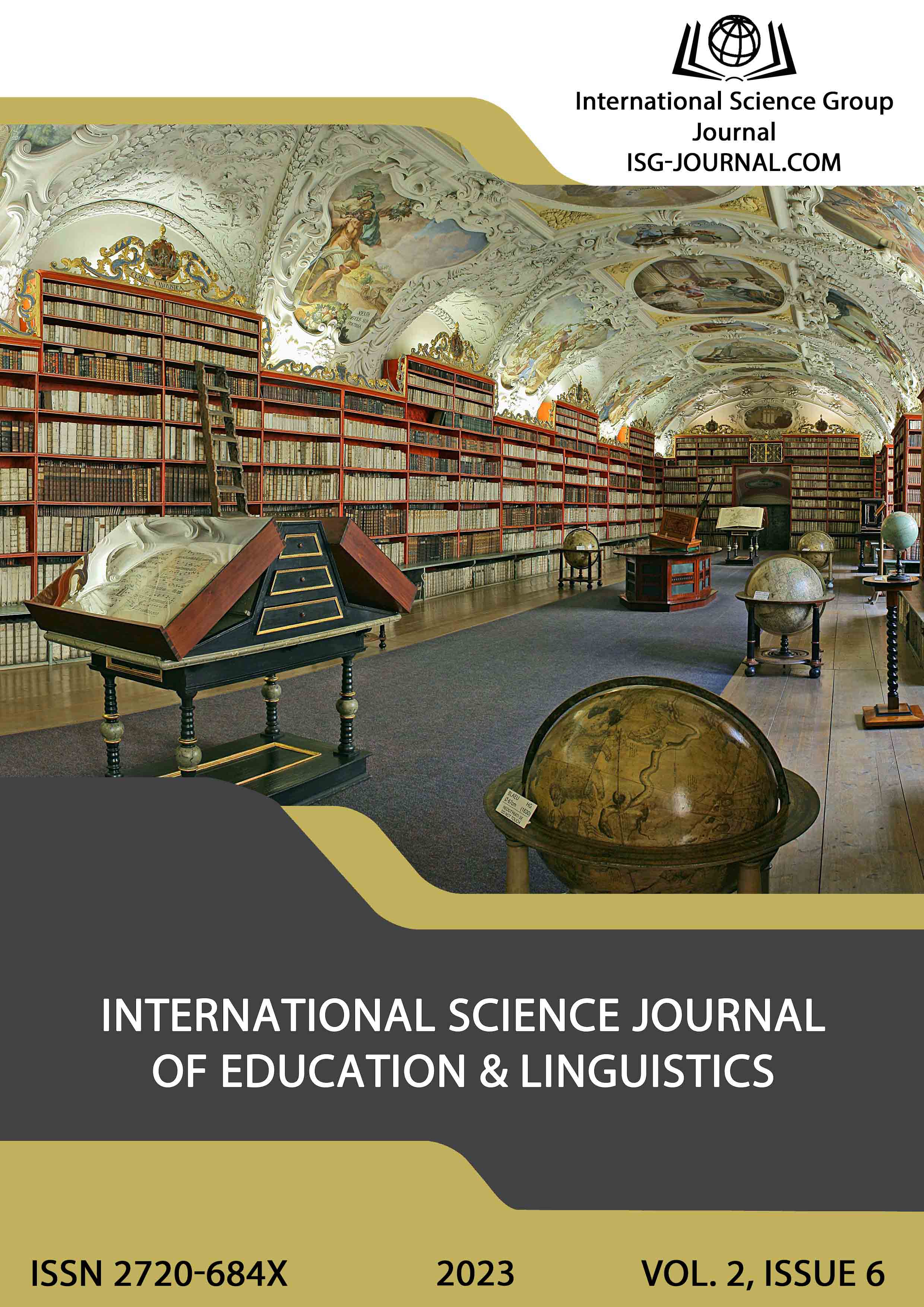Creation of a list of sites for practical and independent study of the Uzbeki language
DOI:
https://doi.org/10.46299/j.isjel.20230206.04Keywords:
language education, independent education, Internet, electronic database, learning the Uzbek languageAbstract
This article is devoted to the creation of an independent educational base, which is considered important in the development of Uzbek language education, in which the strategic approach of the teacher and the pedagogical position are discussed. Considerations regarding the importance, results and application of self-study in teaching the Uzbek language are presented. The role, type and concept of using electronic materials for efficient use of time in the organization of teaching the Uzbek language are also analyzed. In order to prevent various problems when using the Internet, the article reflects the issue of the formation of the language teacher's skills in creating a list of electronic pages. The capacity of the language education audience is small, and the purpose of the study is to propose the creation of a database of electronic pages, which is considered a solution to this problem. Several methods of self-study are also discussed. The author conducted research using the descriptive-classification method and used various metaphors. He described various ways of applying the principle of practice, which is considered important in language education. Instead of stacking, he listed tasks related to the implementation of work, effective use of time; the introduction of interpretation and travel methods to stimulate the interest of the language learner; providing freedom and independence to the language learner; organization of film and theater performances saturated with national flavor, stressing that it is necessary to adhere to the principles of creating a list of national, artistic works that include the history of the Uzbek language. The issue raised in the article is relevant in language education. The opinions of foreign authors are also analyzed. The examples show the importance of using the experience of foreign language education in teaching the Uzbek language.References
Алқоров Қ.Х., Дониёрова Ш.Э., Бурхонов Р.Р. Талабалар мустақил таълим олиш фаолиятини ташкил этиш ва бошқариш технологияси // Вестник науки и творчества. 2020. №12 (60). URL: https://cyberleninka.ru/article/n/talabalar-musta-il-talim-olish-faoliyatini-tashkil-etish-va-bosh-arish-tehnologiyasi
Болтабоев С.А. Таълим жараёнида мустақил ўқув фаолиятини ташкил этиш механизмлари // Современное образование (Узбекистан). 2019. №7 (80). URL: https://cyberleninka.ru/article/n/talim-zharayonida-musta-il-uv-faoliyatini-tashkil-etish-mehanizmlari
Beysenova A., Kadirova X. Mashgʻulotlarda oʼzbek va rus tillaridagi turgʻun birikmalarning lingvokulturologik qiyosiy tahlili // ORIENSS. 2023. №5. URL: https://cyberleninka.ru/article/n/mashg-ulotlarda-o-zbek-va-rus-tillaridagi-turg-un-birikmalarning-lingvokulturologik-qiyosiy-tahlili
Жўраева Н.О. Таълим жараёнида мустақил ўқув фаолиятини ташкил этиш бўйича айрим кўрсатмалар // Таълим ва инновацион тадқиқотлар, №3, 2021. – Б. 170-176. DOI: 10.53885/edinres.2021.35.32.022
Зарипов Л., Хайитов Н., Тоҳиров З. Талабалар мустақил таълимини ташкил этиш: методик қўлланма. – Тошкент: Sano-Standart, 2023. – 32 б.
Kadirova, X.B. O‘zbek tilini xorijiy til sifatida o‘qitishda taʼlim sifatini belgilovchi omillar // International scientific journal of Biruni. 2022. №2. URL: https://cyberleninka.ru/article/n/o-zbek-tilini-xorijiy-til-sifatida-o-qitishda-ta-lim-sifatini-belgilovchi-omillar
Kadirova, X.B. O‘zbek tilini xorijiy til sifatida o‘qitishda taʼlim sifatini belgilovchi omillar // International scientific journal of Biruni. 2022. №2. URL: https://cyberleninka.ru/article/n/o-zbek-tilini-xorijiy-til-sifatida-o-qitishda-ta-lim-sifatini-belgilovchi-omillar
Ражабова С.Ю., Якубова Х.С. Методика независимого обучения. // https://cyberleninka.ru/article/n/metodika-nezavisimogo-obucheniya/viewer
Худайбердиева И., Кадирова Х. (2022). Сложности разница падежей русского и узбекского языков. Перспективы узбекской прикладной филологии, 1 (1). URL: http://compling.navoiy-uni.uz/index.php/conferences3/article/view/277.
Кадирова Хуршида Батировна Классификация по структуре формы эвфемизмов в произведениях Абдуллы Кадири // Вестник науки и образования. 2020. №8-1 (86). URL: https://cyberleninka.ru/article/n/klassifikatsiya-po-strukture-formy-evfemizmov-v-proizvedeniyah-abdully-kadiri
Kadirоva, Xurshida Batirоvna O‘ZLASHGAN O‘ZBЕK ISMLARINING LЕKSIK-SЕMANTIK MUAMMОLARI // ORIENSS. 2023. №1. URL: https://cyberleninka.ru/article/n/o-zlashgan-o-zbek-ismlarining-leksik-semantik-muammolari
Бейсенова, А., & Kadirоva, X. (2022). “Zamonamiz qahramoni” asarida qo‘llangan frazeologizmlarning badiiy tarjimada aks etishi (o‘zbek va rus tillari misolida). Uzbekistan Language and Culture, 5(1). Retrieved from http://aphil.tsuull.uz/index.php/language-and-culture/article/view/4
Мусулманова Н.Р. Структура общего значения категорий времени и наклонения в узбекском языке. Вестник науки и образования №2 (80). Часть 1. 2020. 36-39-с. https://cyberleninka.ru/article/n/struktura-obschego-znacheniya-kategoriy-vremeni-i-nakloneniya-v-uzbekskom-yazyke
Мусулманова, Н. (2022). TALABA-YOSHLARDA ILMIY-TADQIQOT ISHLARINI OLIB BORISH KO‘NIKMASINI SHAKLLANTIRISH. Uzbekistan Language and Culture, 5(1). Retrieved from https://aphil.tsuull.uz/index.php/language-and-culture/article/view/1
Kadirova, X. 2021. Problemi peremeni evfemizmov i disfemizmov v xudojestvennom perevode. // ELMİ İŞ beynəlxalq elmi jurnal. – AZƏRBAYCAN RESPUBLİKASI, Baku. Volume: 15, Issue: 10; St: 17-22. DOI: https://www.doi.org/10.36719/2663-4619/71/17-22
Kadirova X. B. 2021. Evfemicheskiy i disfemicheskiy smisl v strukturno-pragmaticheskom analize // Mirovaya nauka. – №. 4. – S. 123-125. URL: https://www.researchgate.net/profile/Xurshida-Kadirova/publication/352902189_EVFEMICESKIJ_I_DISFEMICESKIJ_SMYSL_V_STRUKTURNO-PRAGMATICESKOM_ANALIZE/links/60ded7dca6fdccb745fc067c/EVFEMICESKIJ-I-DISFEMICESKIJ-SMYSL-V-STRUKTURNO-PRAGMATICESKOM-ANALIZE.pdf
Downloads
Published
How to Cite
Issue
Section
License
Copyright (c) 2023 Khurshida Kadirova

This work is licensed under a Creative Commons Attribution 4.0 International License.





